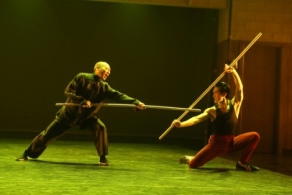Review: Kung Fu

Frances Jue and Cole Horibe in Kung Fu
(©Joan Marcus)
The title of David Henry Hwang’s bio-play about Bruce Lee is ironic in a way that the screen icon would surely have appreciated. It refers not only to the martial arts style for which he was renowned, but also the classic television series he developed as a starring vehicle for himself, only to see a white actor, David Carradine, given the lead role.
Sadly, its title is the most resonant aspect of this stylized effort from the playwright whose previous works include the award-winning M. Butterfly, Golden Child, The Dance and the Railroad and the recent Chinglish. Starring So You Think You Can Dance contestant Cole Horibe in the starring role, this Signature Theatre Company production presents a sketchy, dramatically thin portrait of Lee’s life from his early days in Hong Kong to his eventual return to his birthplace and ascent into screen superstardom after a frustrating sojourn in Hollywood.
The play’s principal theme is Lee’s strained relationship with his domineering father (Frances Jue), whose constant disapproval supposedly led to his intense drive and perfectionism. While it may indeed be true, it’s handled with a Psychology 101 heavy-handedness that fails to sustain interest.
Hwang dutifully touches the biographical bases, including Lee’s relationship with his American wife Linda (Phoebe Strole) and young son Brandon (Bradley Fong); his difficulties getting cast in Hollywood because of his thick accent and the industry’s inherent racism; his martial arts tutoring of such stars as Steve McQueen and James Coburn (Clifton Duncan); and his frustration with his subservient role as Kato in the short-lived television series The Green Hornet. The play ends when he bitterly returns to Hong Kong, a decision that would prove highly fortuitous to his career.
Lee was a fascinatingly complex and charismatic figure, but little of that is apparent here due to the thinness of the writing and the uncharismatic performance by Horibe in his first dramatic role. While the performer certainly possesses the necessary lithe physique and athletic grace, he conveys little of the star’s fierce intensity that galvanized worldwide audiences.
The most striking moments of Leigh Silverman’s fast-paced production are the extensive, beautifully choreographed fight sequences staged by Emmanuel Brown. They manage to be both highly convincing and visually exciting while managing the neat trick of not doing physical harm to the actors. Less felicitous are the numerous dance sequences choreographed by Sonya Tayeh, including an interpretive dance performed to the propulsive Green Hornet theme music and a climactic Chinese-style ballet accompanied by an electronic score. They seem mere filler, tacked on to extend the play’s brief, two hour running time. The non-traditional casting choices are also jarring, including having an African-American actor as Coburn and an Asian-American as TV producer William Dozier.
But the chief problem is the play itself. The flashback sequences depicting Lee’s contentious relationship with his father prove repetitive, and such scenes as when Lee lies immobile on the floor after an injury go on far too long while having little dramatic impact.
Ultimately it all comes across as a misfire, a particularly disappointing one considering the richness of the subject matter and Hwang’s proven ability to explore his themes with greater depth. Kung Fu gives the superficial appearance of making all the right moves, but it fails to land any true body blows.
Pershing Square Signature Center, 480 W. 42nd St. 212-244-7529. www.signaturetheatre.org. Through March 16.
| Print article | This entry was posted by Frank on 02/25/14 at 07:06:58 am . Follow any responses to this post through RSS 2.0. |